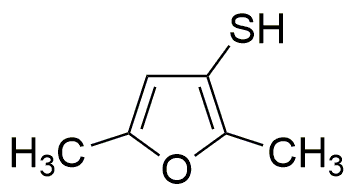2,5-Dimethyl-3-furanthiol is widely utilized in research focused on:
- Flavor and Fragrance Industry: This compound is known for its strong, pleasant aroma, making it a valuable ingredient in food flavoring and fragrance formulations. Its unique scent profile can enhance products like perfumes and scented candles.
- Aromatherapy Products: Due to its aromatic properties, it is often incorporated into essential oils and aromatherapy blends, providing calming and uplifting effects that appeal to wellness enthusiasts.
- Analytical Chemistry: Researchers use this compound as a standard in gas chromatography and mass spectrometry to analyze and identify similar sulfur-containing compounds in various samples, ensuring accurate results in food safety and quality control.
- Biological Research: Its potential antimicrobial properties are being explored in studies aimed at developing natural preservatives for food and cosmetics, offering a safer alternative to synthetic additives.
- Environmental Monitoring: The compound can serve as a marker for assessing the quality of air and water, helping researchers track pollution levels and the presence of organic contaminants in environmental studies.
General Information
Properties
Safety and Regulations
Applications
2,5-Dimethyl-3-furanthiol is widely utilized in research focused on:
- Flavor and Fragrance Industry: This compound is known for its strong, pleasant aroma, making it a valuable ingredient in food flavoring and fragrance formulations. Its unique scent profile can enhance products like perfumes and scented candles.
- Aromatherapy Products: Due to its aromatic properties, it is often incorporated into essential oils and aromatherapy blends, providing calming and uplifting effects that appeal to wellness enthusiasts.
- Analytical Chemistry: Researchers use this compound as a standard in gas chromatography and mass spectrometry to analyze and identify similar sulfur-containing compounds in various samples, ensuring accurate results in food safety and quality control.
- Biological Research: Its potential antimicrobial properties are being explored in studies aimed at developing natural preservatives for food and cosmetics, offering a safer alternative to synthetic additives.
- Environmental Monitoring: The compound can serve as a marker for assessing the quality of air and water, helping researchers track pollution levels and the presence of organic contaminants in environmental studies.
Documents
Safety Data Sheets (SDS)
The SDS provides comprehensive safety information on handling, storage, and disposal of the product.
Product Specification (PS)
The PS provides a comprehensive breakdown of the product’s properties, including chemical composition, physical state, purity, and storage requirements. It also details acceptable quality ranges and the product's intended applications.
Certificates of Analysis (COA)
Search for Certificates of Analysis (COA) by entering the products Lot Number. Lot and Batch Numbers can be found on a product’s label following the words ‘Lot’ or ‘Batch’.
Número de catálogo
Número de lote/lote
Certificates Of Origin (COO)
This COO confirms the country where the product was manufactured, and also details the materials and components used in it and whether it is derived from natural, synthetic, or other specific sources. This certificate may be required for customs, trade, and regulatory compliance.
Número de catálogo
Número de lote/lote
Safety Data Sheets (SDS)
The SDS provides comprehensive safety information on handling, storage, and disposal of the product.
DownloadProduct Specification (PS)
The PS provides a comprehensive breakdown of the product’s properties, including chemical composition, physical state, purity, and storage requirements. It also details acceptable quality ranges and the product's intended applications.
DownloadCertificates of Analysis (COA)
Search for Certificates of Analysis (COA) by entering the products Lot Number. Lot and Batch Numbers can be found on a product’s label following the words ‘Lot’ or ‘Batch’.
Número de catálogo
Número de lote/lote
Certificates Of Origin (COO)
This COO confirms the country where the product was manufactured, and also details the materials and components used in it and whether it is derived from natural, synthetic, or other specific sources. This certificate may be required for customs, trade, and regulatory compliance.


